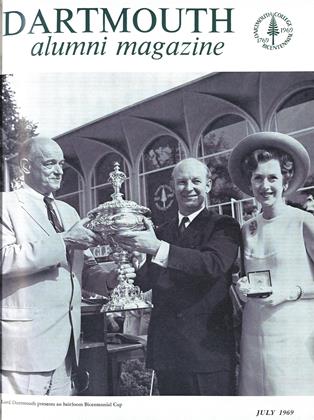As part of an interview with President Dickey published in the June 1969 issue of Yankee to mark both the Bicentennial of the College and the upcoming 25th year of Mr. Dickey's presidency, the question was asked: Are you in favor ofinstituting coeducation at Dartmouth?
President Dickey answered:
"We are unquestionably in the middle of a movement towards coeducation at the moment in this country. It has a fairly long and an honorable history, and has worked elsewhere, as far as I know. But I believe that any institution that is not coeducational should plan a careful and concrete program before going ahead. I don't believe that coeducation here is inevitable, nor is it necessarily wrong. I do urge that it should be examined in relation to all other commitments Dartmouth sees ahead for the next decade. I think we must have concrete answers as to whether Dartmouth's limited resources and limited energies, if directed towards the education of women, would create a stronger institution than if they were directed to other new programs. I think the study now being undertaken will decide this. What is right for Yale, for example, may not necessarily be right for us. Yale is at this point a large, complex university with established graduate programs in most fields. Dartmouth during the past five years or so has established graduate programs at the doctoral level in all of the departments of the sciences, but as yet we do not have such programs in the departments of the humanities, and only one - psychology — is authorized in the social sciences. Introducing coeducation and the costs involved could be quite a different problem for us, and that is what the study must determine."
The President's answer to the Yankee interviewer was consistent with the reply he made to a questioner at the May meeting of Dartmouth class officers. At that time he stated that coeducation at Dartmouth, if it happens at all, will come about only after long and careful study of the pros and cons. It is an issue to be settled, he said, by the next administration, not his. While giving no indication that he is a proponent of the idea, he did add, however, that Dartmouth should not be afraid to study the question straightforwardly. Such a Trustee-sanctioned study is now getting under way The central issue, Mr. Dickey concluded, is educational - Will coeducation make Dartmouth a better and stronger college in the years ahead?
 View Full Issue
View Full Issue
More From This Issue
-
 Feature
FeatureThe Bicentennial Year Officially Opens with Ceremony and Fanfare
July 1969 -
 Feature
FeatureThe 50-Year Address
July 1969 By DR. ROBERT M. STECHER '19 -
 Feature
FeatureCOMMENCEMENT 1969
July 1969 -
 Feature
FeatureThe Senior Valedictory
July 1969 By KENNETH IRA PAUL '69 -
 Feature
FeatureA New Investment Concept: Total Return
July 1969 By JOHN F. MECK '33 -
 Feature
FeatureHONORARY DEGREE CITATIONS
July 1969







